The Joseph Story

Genesis 37: 3-4, 12-28
Now Israel loved Joseph more than any other of his children, because he was the son of his old age; and he had made him a long robe with sleeves. But when his brothers saw that their father loved him more than all his brothers, they hated him, and could not speak peaceably to him. Now his brothers went to pasture their father’s flock near Shechem. And Israel said to Joseph, “Are not your brothers pasturing the flock at Shechem? Come, I will send you to them.” He answered, “Here I am.” So he said to him, “Go now, see if it is well with your brothers and with the flock; and bring word back to me.” So he sent him from the valley of Hebron. He came to Shechem, and a man found him wandering in the fields; the man asked him, “What are you seeking?” “I am seeking my brothers,” he said; “tell me, please, where they are pasturing the flock.” The man said, “They have gone away, for I heard them say, ‘Let us go to Dothan.’”
So Joseph went after his brothers, and found them at Dothan. They saw him from a distance, and before he came near to them, they conspired to kill him. They said to one another, “Here comes this dreamer. Come now, let us kill him and throw him into one of the pits; then we shall say that a wild animal has devoured him, and we shall see what will become of his dreams.” But when Reuben heard it, he delivered him out of their hands, saying, “Let us not take his life.” Reuben said to them, “Shed no blood; throw him into this pit here in the wilderness, but lay no hand on him” —that he might rescue him out of their hand and restore him to his father. So when Joseph came to his brothers, they stripped him of his robe, the long robe with sleeves that he wore; and they took him and threw him into a pit. The pit was empty; there was no water in it. Then they sat down to eat; and looking up they saw a caravan of Ishmaelites coming from Gilead, with their camels carrying gum, balm, and resin, on their way to carry it down to Egypt. Then Judah said to his brothers, “What profit is it if we kill our brother and conceal his blood? Come, let us sell him to the Ishmaelites, and not lay our hands on him, for he is our brother, our own flesh.” And his brothers agreed. When some Midianite traders passed by, they drew Joseph up, lifting him out of the pit, and sold him to the Ishmaelites for twenty pieces of silver. And they took Joseph to Egypt.
The Joseph story that concludes the book of Genesis is a narrative that both entertains and challenges us. It is a deeply human story that depicts humanity not from an unrealistically pious perspective but from the flawed and sinful perspective that we recognize as reflective of our human nature. The tension between Joseph and his brothers illustrates this point well. From the Genesis text, we can get the impression that Joseph was a bit difficult. He was his father’s favorite son— a fact Jacob did not seem to hide, as evidenced by the special robe he made for his son.
Joseph’s dream, interpreted to his siblings as a sign that he would rule over them, surely did not help the situation. We probably should not be surprised that the brothers found Joseph irritating, but we are certainly meant to be shocked by the plot of his brothers, first to kill him and later to abandon him in a pit. Such cruelty to another human being is difficult to understand, but it is all the more difficult to understand when directed at a loved one. Joseph’s brothers abandon him and condemn him to be sold into slavery. Their cruelty affects not only Joseph but also their father and ultimately the brothers themselves. The effects of such acts ripple out and engulf many. Though we know the full story does not end there, the text today does end there and thus invites us to reflect on the story at its most appalling moment.
As contemporary readers and hearers of the story, we can easily dismiss the actions of the brothers as heinous. The more demanding task, one worthy of our efforts as we continue the Lenten journey, is to ask how the story reflects to us something of ourselves. To do us requires us to ask how we have manifested cruelty, no doubt of a different type and degree, in our own lives. It is demanded of us that we look at ourselves with searing honesty, acknowledging our sins and flaws and praying for the grace to amend our lives, trusting that God is at work in all circumstances and challenges, accomplishing in and through us infinitely more than we can ever ask or imagine.
prayer
Grant, O Lord, that as your Son Jesus Christ prayed for his enemies on the cross, so we may have grace to forgive those who wrongfully or scornfully use us, that we ourselves may be able to receive your forgiveness; through Jesus Christ our Lord, who lives and reigns with you and the Holy Spirit, one God, for ever and ever. Amen.
—Lesser Feasts and Fasts, 2006, 42